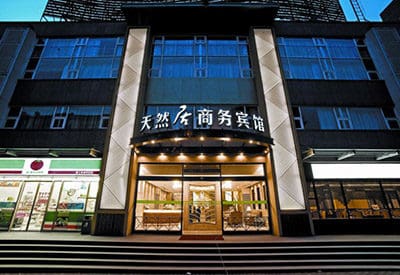
The Starway Parkview South Station Hotel will be converted to a co-living facility
Hong Kong real estate investment house Pamfleet has landed its first deal in mainland China, signing an agreement with Hong Kong-listed Deson Development International last week for a RMB 82 million ($12.26 million) joint venture residential project, according to a statement by Deson to the Hong Kong stock exchange.
In an exclusive interview with Mingtiandi, Pamfleet revealed that it plans to work with Deson to convert the Starway Parkview South Station Hotel, a 7,318 square metre (78,770 square foot) property near the Shanghai Botanical Garden in the city’s Xuhui district, into an 80 unit co-living facility.
Pamfleet, which made its name refurbishing office properties in Hong Kong, has recently begun to devote more of its resources towards opportunities in mainland China.
Co-Living in Southern Shanghai
Under the terms of the joint venture deal, a wholly owned subsidiary of Pamfleet is paying RMB 57.4 million for a 70 percent stake in the joint venture with Deson, which according to its website has a portfolio of six properties across China, including the Shanghai hotel.

Kelvin Wong of Pamfleet
In addition to retaining a 30 percent stake in the joint venture, Deson will also assist in managing the asset. “In Hong Kong, we’re known for rolling our sleeves up and carrying out asset management ourselves,” said Kelvin Wong, a managing director at Pamfleet. “But on the mainland, we see the virtue of working with established partners who have already developed teams on the ground.” While noting that Pamfleet will consider managing projects directly on the mainland once it has built a larger portfolio and expanded its team, Wong noted that, “Working in any new market is a learning process and for us right now it’s about identifying the right partners as much as sourcing the best projects.”
The four-storey structure on Baise Road south of Shanghai Indoor Stadium currently has 56 guest rooms, plus retail space on the ground floor. Pamfleet, which made its name with projects like Infinitus Plaza in Hong Kong’s Sheung Wan district, plans to rebrand and convert the building for use as multi-family co-living space, in addition to increasing the number of rooms.
Inspired by the WeWork-led co-working phenomena, co-living companies create shared living communities that have proved popular with young professionals in the US and European markets. In Asia, Campus Hong Kong is already operating a co-living facility in Tsuen Wan, New Territories after converting 48 one-bedroom apartments into four-bed dormitory rooms, with other developers offering competing projects.
WeWork launched the first project by its own co-living division, WeLive, in April of this year on New York’s Wall Street.
Pamfleet Starts Deploying $55 Million Fund
Pamfleet’s Shanghai deal follows soon after it conducted a $55 million closing on its Pamfleet Shanghai Real Estate Fund in June, and just after it brought on board its first full-time mainland staffer this week.
With this first deal signed, Pamfleet told Mingtiandi that the market should expect more news from the value-add specialists. “We would be relatively comfortable taking on commercial projects in Shanghai, and we are actively pursuing several commercial options in the market to create flexible office facilities,” Wong said. The fund manager indicated that more China projects could be on the way within the next year as the mainland fund settles into a planned deployment phase.
Pamfleet’s inaugural mainland investment vehicle was wholly subscribed by Switzerland-based private equity firm Partners Group, and similar to Pamfleet’s PREF and PREF II funds, focuses on value-add opportunities. The fund is targetting deals in Shanghai, along with other tier one Chinese cities.

Leave a Reply